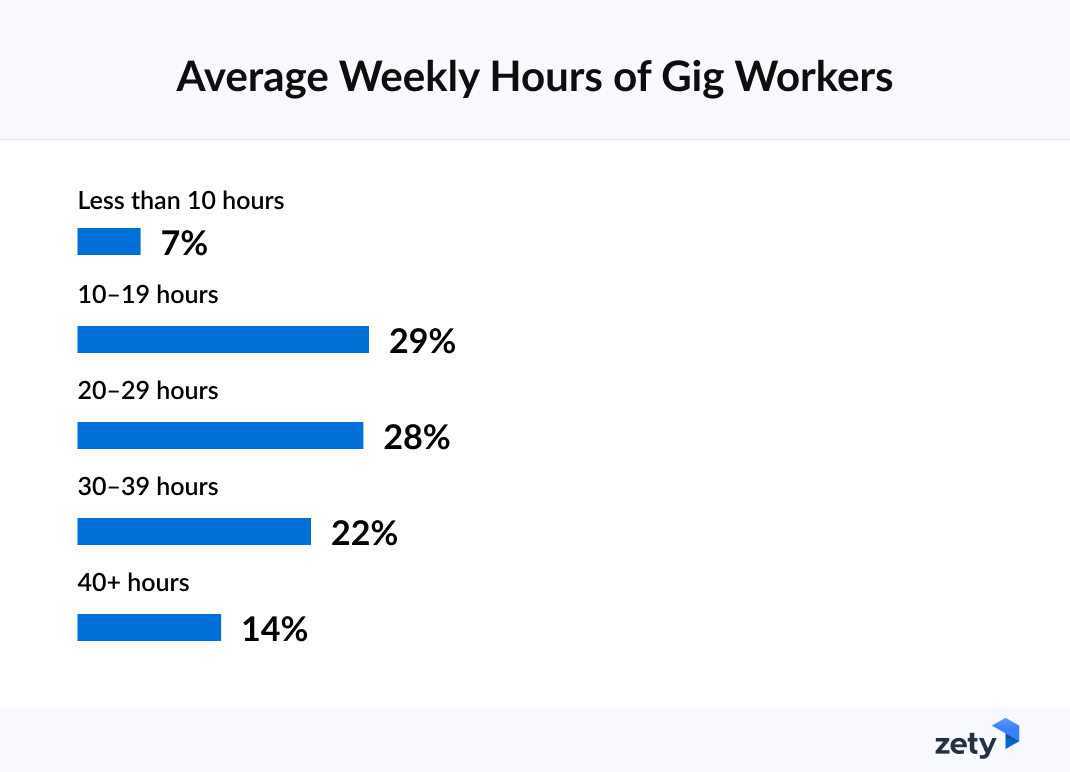
Building on its 2025 State of Gig Work Report, Zety conducted a follow-up survey of more than 900 U.S. gig workers to better understand the motivations, time commitments, and career challenges of gig work.
The Gig Worker Outlook Report found that more than half (52%) are new to gig work, having started within the past year, underscoring rapid growth in the gig economy. From newcomers to experienced independents, the report captures how technology, flexibility, and financial necessity are reshaping modern work.
Key findings:
- 52% of gig workers started within the past year.
- 50% cite supplemental income as their main motivation; 43% want to gain experience or build new skills.
- Nearly 1 in 7 work 40+ hours per week, effectively full-time.
- 86% say AI has created new types of gig opportunities.
- 91% report a positive impact on mental health.
- 94% plan to continue gig work long term.
Motivations and Long-Term Outlook
The majority of gig workers see their work as a sustainable, long-term path: 94% plan to continue gig work long term. Their motivations range from financial needs to skill development and flexibility:
- 50% use it to supplement their income.
- 43% use it to gain experience or build skills.
- 41% rely on it as their primary source of income.
- 37% value the flexibility it provides.
- 30% work gigs because they can’t find a full-time job.
- 26% prefer the independence or remote nature of gig work.
- 13% seek better work-life balance.
What this means: The findings point to a clear evolution in how people define work stability and success. Many are designing careers that prioritize adaptability, learning, and personal fulfillment over conventional employment paths.
Tenure and Time Commitment of Gig Workers
Nearly half of respondents (49%) have been gig working for a year or less, highlighting the rapid influx of new participants into the gig economy.
Experience with gig work:
- Less than 3 months (3%)
- 3–6 months (21%)
- 7–12 months (28%)
- 1–2 years (26%)
- 3–5 years (17%)
- More than 5 years (5%)
Hours spent weekly on gig work:
More than one-third (36%) spend 30+ hours weekly, underscoring how gig work has become a primary source of income for many:
- Less than 10 hours (7%)
- 10–19 hours (29%)
- 20–29 hours (28%)
- 30–39 hours (22%)
- 40+ hours (14%)

What this means: These figures suggest that independent work is becoming deeply rooted in the broader labor market. The steady flow of new entrants and the high weekly engagement indicate growing trust in nontraditional ways to earn a living.
AI Drives Productivity and Opportunity
Artificial intelligence has become an essential part of how gig workers operate, helping them complete tasks more efficiently, expand their skill sets, and explore new ways to earn. The survey reveals how deeply AI is embedded in gig work:
- 94% have used AI tools (e.g., ChatGPT, Midjourney) to support their work.
- 88% believe AI tools have increased the value of their skills in the gig economy.
- 86% feel AI has created new types of gig opportunities.
What this means: Gig workers are boosting efficiency, learning new skills, and accessing new earning opportunities by taking advantage of AI tools for freelancers. Rather than replacing human effort, AI is amplifying productivity and professional value.
Mental Health for Gig Workers
Most gig workers (91%) report that gig work has had a positive impact on their mental health overall, yet many experience stress and isolation. While gig work provides flexibility and autonomy, it also comes with emotional challenges:
Loneliness and isolation:
- 58% experience it frequently.
- 35% experience it occasionally.
Burnout and stress:
- 54% experience it frequently.
- 40% experience it occasionally.
What this means: While many thrive in flexible environments, the emotional toll of working solo shouldn’t be overlooked. Building networks and mental health resources tailored to independent professionals may help address these challenges.
For press inquiries, contact Skyler Acevedo, Public Relations Specialist, at skyler.acevedo@bold.com.
Methodology
The findings presented are based on a nationally representative survey conducted by Zety on August 19, 2025. The survey collected responses from 903 gig workers across the U.S., examining their experiences with gig work, financial stability, platform challenges, and benefits access. Participants answered a mix of yes/no questions, scale-based items to measure agreement or frequency, and multiple-choice questions allowing selection of multiple responses. To qualify, respondents had to report currently having at least one gig job (defined as temporary, flexible work typically paid per task or project rather than a traditional salaried position) at the time of the survey.
About Zety
Zety resume templates and Zety's Resume and Cover Letter Generator are trusted by 12 million users each year. With 100s of options to choose from, including professionally designed resume templates to beat the ATS, users can create a professional resume in less than 15 minutes. Since 2016, Zety’s career blog has provided free data-driven insights to over 40 million readers annually, empowering professionals at every stage. The editorial team includes Certified Professional Resume Writers, with the best career advice and evidence-based findings featured in Business Insider, CNBC, and Forbes, among others. Follow Zety on Facebook, LinkedIn, YouTube, and Instagram for free expert career tips and updates.


